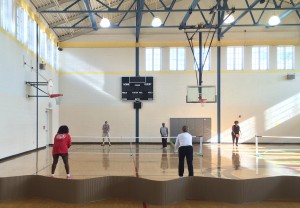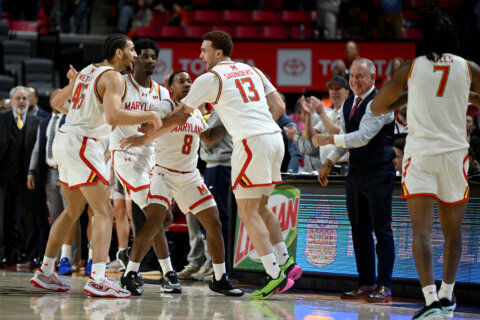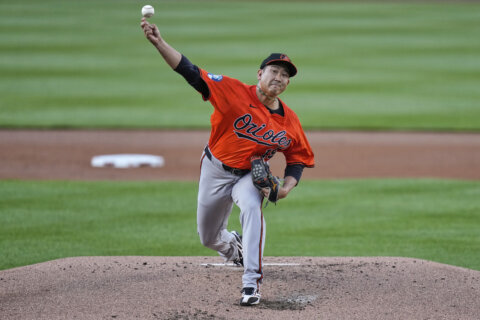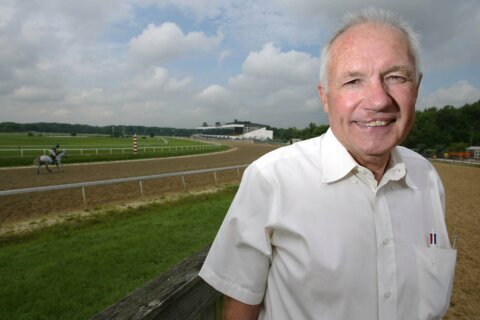WASHINGTON — Just what the heck is pickleball? With a name like that, the sport both demands and requires an explanation. And like any great story, it all starts with the family dog.
One day in 1965, former Rep. Joel Pritchard was playing with his children in the badminton court his yard on Bainbridge Island, across Puget Sound from Seattle. Using the space and materials available to them (namely rackets and a whiffle ball), they improvised a tennis/badminton hybrid, allowing for a competitive game without nearly as much scampering around that everyone could partake in. When the ball would get away, it would be retrieved by the family’s cocker spaniel, Pickles.
So was born pickleball.
Roughly 50 years and 11 million players later, the growing sport has its own national governing body and has made its way to the District, with three D.C. Department of Parks and Recreation (DPR) centers hosting lessons and open play as part of a pilot program for those interested in picking the sport up. While the game has grown in the Northern Virginia suburbs over the past couple years, this is the first organized version of the sport in Washington itself.
The rules and gameplay are pretty easy to grasp on a basic level for anyone with a tennis or Ping-Pong background. One player serves to the other in the opposite quadrant of the court, and the two players hit the ball back and forth over the net. But there are a couple additional provisions to keep the game at a slower pace.

For starters, serves are done underhand, and both the returner and the server must let the ball bounce on the first hit to them before sending it back over the net. Second, there is the “kitchen,” a zone of 7 feet on either side of the net which a player is forbidden from entering to play the ball to keep them from spiking it over the net.
“The people who tend to pick it up quickly are people who have played tennis,” says Scott Parker, one of the volunteers helping to run the pilot program at Emery Recreation Center.
“Even for those who didn’t have any racket sport background, it’s a pretty easy game to pick up. It’s harder to get good at it. But it’s relatively easy to pick up the game and have fun.”
While the game can be played by anyone, it lends itself to active seniors, as the range of motion required is less aggressive than in tennis or racquetball. And with the boomer generation reaching retirement age in rapid numbers, the game has become a favorite new hobby.
“Since 2010 — essentially when you started seeing people at the end of the baby boomer era getting more discretionary time, retired, semiretired, whatever — this is a game that’s easy for them to learn, relatively easy for them to play, and fun,” says Parker.
He learned about the game a few years ago at a high school reunion. Another volunteer, Bob Buck, heard about it through a former co-worker while on vacation last summer. As a former Ping-Pong and tennis player, it resonated with him immediately, and he joined in the seniors tournament that was held through DPR last year.
“It’s a nice pace, it’s sort of a moderate impact, especially doubles,” says Buck, but warns that it can look deceptively easy. “I played one singles match in that first tournament — it’s exhausting. It looks like a small court. It’s not.”
That level of challenge elevates pickleball from the likes of shuffleboard or other retirement community type activities. It’s for everyone, yes, but it still appeals to the competitive spirit.
“I’ve heard a lot of people say that when they realize their tennis career is ending that they’re going to transition into pickleball,” says Buck.
“I think that’s a good plan. But for the winter, maybe you want to add pickleball anyway, instead of paying for court time indoors to keep playing tennis, come to the free rec program and play pickleball.”
There are almost 100 players so far that have come out to programs at the three recreation centers in D.C., but the program will need to continue to grow to be sustainable and to be picked up full-time moving forward. For more information on attending, visit dpr.dc.gov or call Jeri Ingram at 202-215-4432.








